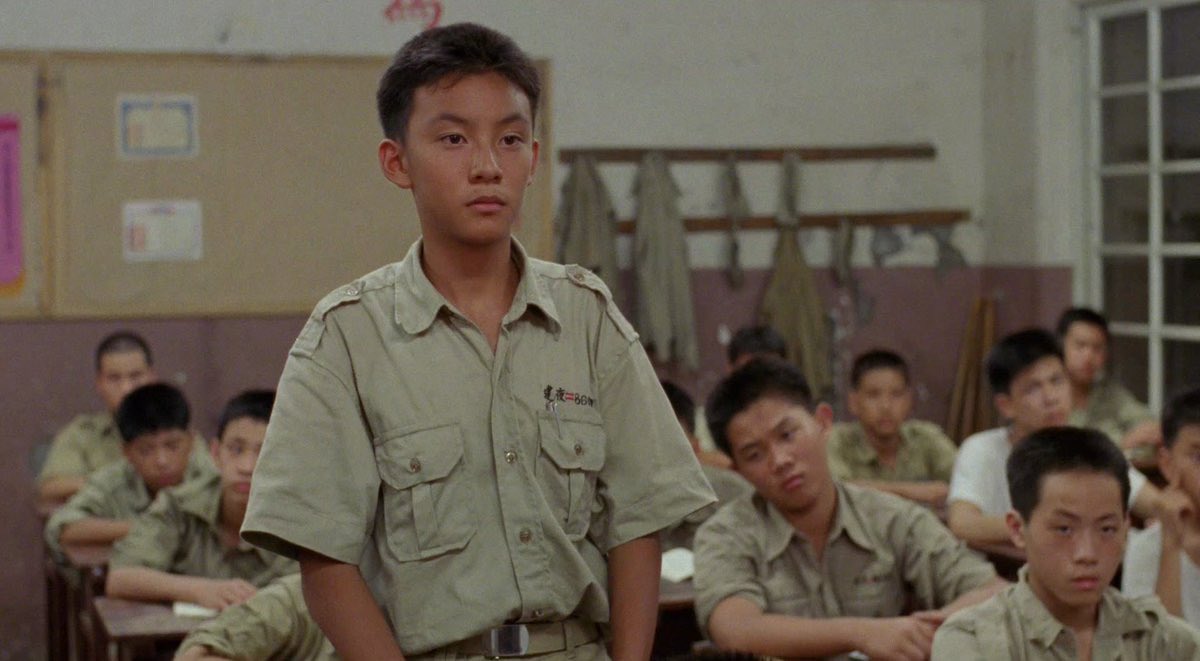by Ivy Hung
語言:
English
Photo Credit: Film Still
EDWARD YANG’s CLASSIC A Brighter Summer Day is a film split by its focus on the family and friendship bonds surrounding Si’r, the main character. Though supporting a boisterous cast with characters of all backgrounds, from a displaced family after the Chinese Civil War to friends and foe of notorious street gangs, his bond with his second sister stands apart as the only one where he is able to find a shared understanding of each other.
Nameless and absent from a large majority of the movie’s most poignant moments, Si’r’s second sister is left without much development and characterization, with most information about her being revealed in short, two-line scenes. Her only notable traits–aside from her position in the family–is her devotion and faith in Catholicism, though her mother comments on it being a hindrance to her school work. With her faith, she becomes an outlier in the family, as no other member is shown to be religiously inclined This gives weight to the idea that she developed this faith from the same reason Si’r joined the Little Park Boys, out of a confusion in identity and environmental turmoil, a common reason why people become religious. In this sense, she serves as a direct mirror to Si’r, in many aspects of their respective characters.
Despite their similar age and standing in the family, as the middle children of the household, their actions and sense of self diverge as a result of the path they choose to cope with the change in their lives, from the growing instability in the country’s political climate to the continuous struggle of accepting their now permanent home. Where Si’r turns to delinquency as an outlet for his tumultuous emotions, his second sister turns to God as an answer for her questions and troubles, allowing her religion to help her maintain an upright sense of morality while Si’r is uncertain in his identity. This inner conflict is shown by Si’r’s constant hesitancy to commit any serious violence, an example being the scene where he abandons the idea of hitting the local shopkeeper with a stone as soon as he witnesses him in serious trouble, always remaining the person shy of taking actual action unlike his fellow gang members. His hesitancy, however, is tipped over once pushed over the final edge as he finally commits an act of violence and kills Ming–the girl he once liked–in the film’s conclusion.

Film still
Before this act takes place, Si’r’s older brother, Lao Er, takes the blame for the loss of their mother’s precious watch, leading to him being beaten by their father as punishment. On that day, Si’r’s sister accompanies him through the night and talks to him by his bedside to comfort him, along with offering a reprieve to his strife by giving him a piece of her own answer– that is, leaning on God, and asking him to think about what he has done for others. His sister shares this with him because it is her own method of handling her internal crisis and she believes it to be a way out for him too, as it gives way for Si’r to find a way out from a path full of bloodshed and endless revenge. However, this is too late in the story, as Si’r has already arrived at his breaking point with news that the last thing he can call “his”–Ming, the main heroine in the story–is now in a relationship with his best friend.
From this point onward, Ming’s death is imminent as she clashes with Si’r’s desperate attempts at keeping her to himself as his last emotional outlet. With this, the dam holding up Si’r’s last efforts to maintain a sense of himself comes gushing out as all the small fragments he clung to for his own identity have slowly chipped away: his home in China, his diligent schoolboy image, his street gang, and now, finally, his girlfriend. Though his struggles don’t warrant nor justify what he had committed, Si’r’s last actions are a result of the environment around him and the uncertainty for how long his life can remain a singular way, with the pressing military presence of the Kuomingtan, recently having taken over Taiwan, and his parents’ own concerns when it comes to assimilating into Taiwanese society and their past connections in China. That night, Ming’s life would not be the last one lost from this period, instead her death would be a chain for what was to come during that bloody time, yet what would emerge, something Si’r’s second sister managed to achieve, would be a new Taiwanese identity forged by heavy hardship and hope for a brighter day.



